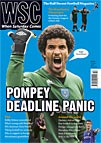 Dear WSC
Dear WSC
A disgraceful and embarrassing recent football scene. I refer of course to the UEFA Champions League draw on August 27. They managed to stretch the whole process into a tedious one hour plus show, surely beating last year’s record. It was volume off after 15 minutes. John Terry’s “Primark UEFA” suit was one button too tight, and he had to be shown where to go as he walked off stage. It was like he couldn’t remember as he was too dazzled by the whole occasion. The two guys in charge had a height difference between them of about five feet, which again must be a record for a televised draw. The main mystery is why Kenny Dalglish et al deemed it necessary to write down who they would be playing? Must be a bit like Sudoku, the only way to keep yourself awake while on holiday. Or are they all incapable of remembering the names of three other teams?
Mark Lindop, Gravesend
The Archive
Articles from When Saturday Comes. All 27 years of WSC are in the process of being added. This may take a while.
 Paul Joyce looks back at Lucerne's Nationalliga A triumph, their sole league title to date
Paul Joyce looks back at Lucerne's Nationalliga A triumph, their sole league title to date
The long-term significance
In 1987, the Nationalliga A was reduced from 16 to 12 clubs and the season was split into two parts. After a pre-Christmas “qualifying round”, points were halved and carried forward into a “final round” contested by the top eight clubs. As their budgets increased, Swiss clubs were able to attract young overseas talent and also ageing stars, such as Marco Tardelli, who looked forward to playing the “stress-free football” that Karl-Heinz Rummenigge was enjoying at Servette. By 1989, 46 per cent of players in the NLA were foreigners. These changes made the league harder to predict. Neuchâtel Xamax won their only two championships in 1987 and 1988, and FC Lucerne’s sole league title followed in 1989.
 Hooliganism is not attractive, but the media are more than willing to exploit its financial potential
Hooliganism is not attractive, but the media are more than willing to exploit its financial potential
We received a call at the WSC office from a researcher at the BBC. He was canvassing views about football violence for a forthcoming programme. He had an angle, prompted by recent events: “It’s never really gone away, has it? Should we not be concerned about what might happen at the World Cup?” This was in 1990.
 The papers were pleased by the trouble at West Ham v Millwall – it gave them a reason to get angry
The papers were pleased by the trouble at West Ham v Millwall – it gave them a reason to get angry
“We hoped it had disappeared forever but deep down we knew it was still out there festering, simmering.” Unfortunately Ken Dyer of London’s Evening Standard was not speaking about the hypocritical moralising of the great British newspapers, but rather the shocking, photogenic and highly lucrative stories about football hooliganism in the wake of the violence at West Ham v Millwall. “Today, when the blood is washed from the pavements of east London and the ripped seats, coins and debris are cleared from the pitch, questions will be asked,” mused Dyer evocatively. Perhaps, prior to writing about the “violence we prayed had left our game for good”, he ought to have questioned his paper’s marketing team’s use of billboards plastered with the gaudy advertisement: Football riots – all the pictures inside.
 Referees seek respect with the help of the FA's new season guidelines
Referees seek respect with the help of the FA's new season guidelines
Every football season begins with a “clampdown”. Traditionally this involves new FA directives intended to punish foul play accompanied by a healthy dose of moral hysteria about the state of game. On the pitch, referees attempt to implement the new rules, producing a spate of early bookings and a subsequent outcry from managers. Match officials feel the need to loosen their interpretation of the new disciplinary regime a little, often after a meeting with managers at which “robust views” are exchanged. We end up roughly back to how things were before, except that at least one match official will have been maligned in highly personal terms.